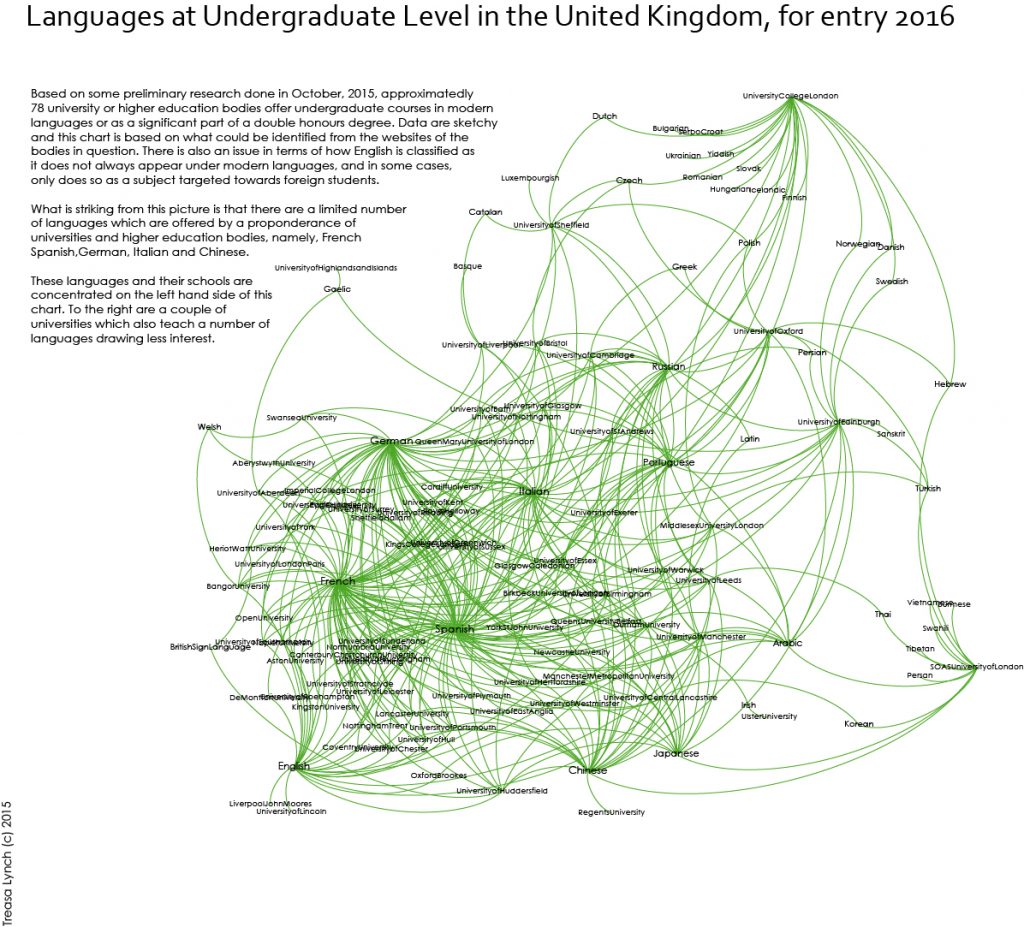I write, from time to time, on language related matters and one of the items on my list of backburner projects was to have a look at undergraduate language options in the United Kingdom. I had a look at Ireland as well but since we have 7 universities, there isn’t very much of interest to consider when it comes to language provision in Ireland. UCC is about your best option there. I’ll post the graph of that later.
The United Kingdom is interesting for a couple of reasons: firstly, tuition provision in languages has been falling off a cliff there and language departments have been closing near hand over fist. One of my recollections relating to language tuition provision in the university sector was that there was a great breadth of provision in terms of languages offered when I was looking for somewhere to study back in 1990, and given changes to language related matters in the UK in the interim, I was interested to see how things looked. Data, however, is not that easily come by and in the end I would up collecting it manually.
One of the things I wanted to do was see what the obvious clusters were and it occurred to me that using languages and higher education organisations as nodes might allow a network chart to be built. I actually did a proof of concept of that with the Irish provisions purely because there were neither too many languages nor too many universities (seven of the latter and not far off seven for the former). The network depicting software which I used was Gephi.
According to the basic research which I did, 78 higher education organisations are offering primary degrees of which a language is a major component. I suspect, if I were to look more closely and root out things like “International Business With A Language” type degrees, the number of pure language related courses would be significantly lower. I have not decided how best to sort out data to get that information and I may not do it just yet.
Eventually, when I plotted things, there was an interesting imbalance on the graph. I noted this on the graph itself for which you can find here, but it is obvious enough below too.
 What this tells you is that if you want to learn anything other than, effectively, French, Spanish, English, Italian, German, Russian or Chinese, most of your options are limited to two universities in London or one in Edinburgh. The overwhelming number of universities which offer any language study at all draw primarily from the seven listed above. There are a few stragglers around but that’s more or less the way things are.
What this tells you is that if you want to learn anything other than, effectively, French, Spanish, English, Italian, German, Russian or Chinese, most of your options are limited to two universities in London or one in Edinburgh. The overwhelming number of universities which offer any language study at all draw primarily from the seven listed above. There are a few stragglers around but that’s more or less the way things are.
One of the things I would consider doing with this data at some stage is comparing language provision in the United Kingdom with language provision in the university sector in a bunch of other European countries, and also, looking at comparing provision of official European languages within the university sector across Europe. I really have no idea how I could quickly get this data together – I do not know if it’s even available anywhere. But it would be interesting to see where the holes exist in terms of provision of tuition at university level of official European languages.